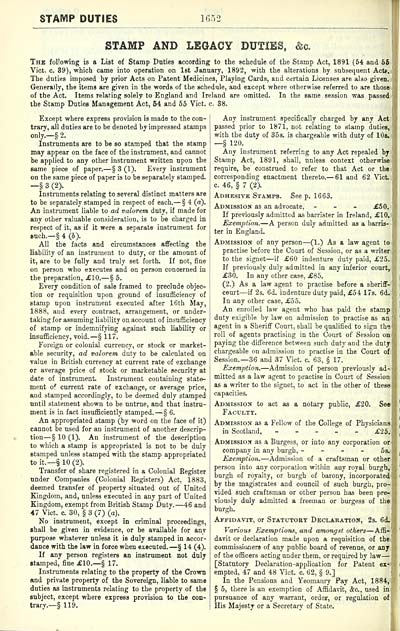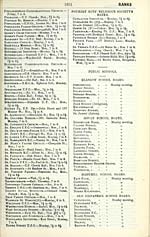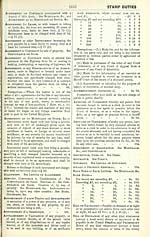Download files
Complete book:
Individual page:
Thumbnail gallery: Grid view | List view

STAMP DUTIES
1652
STAMP AND LEGACY DUTIES, &c.
The following is a List of Stamp Duties according to the schedule of the Stamp Act, 1891 (54 and 55
Vict. c. 39), which came into operation on 1st January, 1892, with the alterations by subsequent Acts.
The duties imposed by prior Acts on Patent Medicines, Playing Cards, and certain Licenses are also given.
Generally, the items are given in the words of the schedule, and except where otherwise referred to are those
of the Act. Items relating solely to England and Ireland are omitted. In the same session was passed
the Stamp Duties Management Act, 54 and 55 Vict. c. 38.
Except where express provision is made to the con-
trary, all duties are to be denoted by impressed stamps
only.— § 2.
Instruments are to be so stamped that the stamp
may appear on the face of the instrument, and cannot
be applied to any other instrument written upon the
same piece of paper. — § 3 (1). Every instrument
on the same piece of paper is to be separately stamped.
-§ 3 (2).
Instruments relating to several distinct matters are
to be separately stamped in respect of each. — § 4 (a).
An instrument liable to ad valorem duty, if made for
any other valuable consideration, is to be charged in
respect of it, as if it were a separate instrument for
such. — § 4 (6).
All the facts and circumstances affecting the
liability of an instrument to duty, or the amount of
it, are to be fully and truly set forth. If not, fine
on person who executes and on person concerned in
the preparation, £10. — § 5.
Every condition of sale framed to preclude objec-
tion or requisition upon ground of insufficiency of
stamp upon instrument executed after 16th May,
1888, and every contract, arrangement, or under-
taking for assuming liability on account of insufficiency
of stamp or indemnifying against such liability or
insufficiency, void. — § 117.
Foreign or colonial currency, or stock or market-
able security, ad valorem duty to be calculated on
value in British currency at current rate of exchange
or average price of stock or marketable security at
date of instrument. Instrument containing state-
ment of current rate of exchange, or average price,
and stamped accordingly, to be deemed duly stamped
until statement shown to be untrue, and that instru-
ment is in fact insufficiently stamped. — § 6.
An appropriated stamp (by word on the face of it)
cannot he used for an instrument of another descrip-
tion — § 10 (1). An instrument of the description
to which a stamp is appropriated is not to be duly
stamped unless stamped with the stamp appropriated
to it.— § 10 (2).
Transfer of share registered in a Colonial Register
under Companies (Colonial Registers) Act, 1883,
deemed transfer of property situated out of United
Kingdom, and, unless executed in any part of United
Kingdom, exempt from British Stamp Duty. — 46 and
47 Vict, c 30, § 3 (7) (a).
No instrument, except in criminal proceedings,
flhall be given in evidence, or be available for any
purpose whatever unless it is duly stamped in accor-
dance with the law in force when executed. — § 14 (4).
If any person registers an instrument not duly
stamped, fine £10. — § 17.
Instruments relating to the property of the Crown
and private property of the Sovereign, liable to same
duties as instruments relating to the property of the
subject, except where express provision to the con-
trary. — § 119.
Any instrument specifically charged by any Act
passed prior to 1871, not relating to stamp duties,
with the duty of 35s. is chargeable with duty of 10s.
— § 120.
Any instrument referring to any Act repealed by
Stamp Act, 1891, shall, unless context otherwise
require, be construed to refer to that Act or the
corresponding enactment thereto. — 61 and 62 Vict.
c. 46, § 7 (2).
Adhesive Stamps. See p. 1663.
Admission as an advocate, - £50. 1 |
If previously admitted as barrister in Ireland, £10.
Exemption. — A person duly admitted as a barris-
ter in England.
Admission of any person — (1.) As a law agent to
practise before the Court of Session, or as a writer
to the signet — if £60 indenture duty paid, £25.
If previously duly admitted in any inferior court,
£30. In any other case, £85.
(2.) As a law agent to practise before a sheriff-
cenrt — if 2s. 6d. indenture duty paid, £54 17s. 6d.
In any other case, £55.
An enrolled law agent who has paid the stamp
duty exigible by law on admission to practise as an
agent in a Sheriff Court, shall be qualified to sign the
roll of agents practising in the Court of Session on
paying the difference between such duty and the duty
chargeable on admission to practise in the Court of
Session.— 36 and 37 Vict. c. 63, § 17.
Exemption. — Admission of person previously ad-
mitted as a law agent to practise in Court of Session
as a writer to the signet, to act in the other of these
capacities.
Admission to act as a notary public, £20. See
Faculty.
Admission as a Fellow of the College of Physicians
in Scotland, - £25.
Admission as a Burgess, or into any corporation or
company in any burgh, 5s,
Exemption. — Admission of a craftsman or other
person into any corporation within any royal burgh,
burgh of royalty, or burgh of barony, incorporated
by the magistrates and council of such burgh, pro-
vided such craftsman or other person has been pre-
viously duly admitted a freeman or burgess of the
burgh.
Affidavit, or Statutory Declaration, 2s. 6d.
Various Exemptions, and amongst others — Affi-
davit or declaration made upon a requisition of the
commissioners of any public board of revenue, or any
of the officers acting under them, or required by law —
[Statutory Declaration-application for Patent ex-
empted, 47 and 48 Vict. c. 62, § 9.]
In the Pensions and Yeomanry Pay Act, 1884,
§ 5, there is an exemption of Affidavit, &c, used in
pursuance of any warrant, order, or regulation of
His Majesty or a Secretary of State.
1652
STAMP AND LEGACY DUTIES, &c.
The following is a List of Stamp Duties according to the schedule of the Stamp Act, 1891 (54 and 55
Vict. c. 39), which came into operation on 1st January, 1892, with the alterations by subsequent Acts.
The duties imposed by prior Acts on Patent Medicines, Playing Cards, and certain Licenses are also given.
Generally, the items are given in the words of the schedule, and except where otherwise referred to are those
of the Act. Items relating solely to England and Ireland are omitted. In the same session was passed
the Stamp Duties Management Act, 54 and 55 Vict. c. 38.
Except where express provision is made to the con-
trary, all duties are to be denoted by impressed stamps
only.— § 2.
Instruments are to be so stamped that the stamp
may appear on the face of the instrument, and cannot
be applied to any other instrument written upon the
same piece of paper. — § 3 (1). Every instrument
on the same piece of paper is to be separately stamped.
-§ 3 (2).
Instruments relating to several distinct matters are
to be separately stamped in respect of each. — § 4 (a).
An instrument liable to ad valorem duty, if made for
any other valuable consideration, is to be charged in
respect of it, as if it were a separate instrument for
such. — § 4 (6).
All the facts and circumstances affecting the
liability of an instrument to duty, or the amount of
it, are to be fully and truly set forth. If not, fine
on person who executes and on person concerned in
the preparation, £10. — § 5.
Every condition of sale framed to preclude objec-
tion or requisition upon ground of insufficiency of
stamp upon instrument executed after 16th May,
1888, and every contract, arrangement, or under-
taking for assuming liability on account of insufficiency
of stamp or indemnifying against such liability or
insufficiency, void. — § 117.
Foreign or colonial currency, or stock or market-
able security, ad valorem duty to be calculated on
value in British currency at current rate of exchange
or average price of stock or marketable security at
date of instrument. Instrument containing state-
ment of current rate of exchange, or average price,
and stamped accordingly, to be deemed duly stamped
until statement shown to be untrue, and that instru-
ment is in fact insufficiently stamped. — § 6.
An appropriated stamp (by word on the face of it)
cannot he used for an instrument of another descrip-
tion — § 10 (1). An instrument of the description
to which a stamp is appropriated is not to be duly
stamped unless stamped with the stamp appropriated
to it.— § 10 (2).
Transfer of share registered in a Colonial Register
under Companies (Colonial Registers) Act, 1883,
deemed transfer of property situated out of United
Kingdom, and, unless executed in any part of United
Kingdom, exempt from British Stamp Duty. — 46 and
47 Vict, c 30, § 3 (7) (a).
No instrument, except in criminal proceedings,
flhall be given in evidence, or be available for any
purpose whatever unless it is duly stamped in accor-
dance with the law in force when executed. — § 14 (4).
If any person registers an instrument not duly
stamped, fine £10. — § 17.
Instruments relating to the property of the Crown
and private property of the Sovereign, liable to same
duties as instruments relating to the property of the
subject, except where express provision to the con-
trary. — § 119.
Any instrument specifically charged by any Act
passed prior to 1871, not relating to stamp duties,
with the duty of 35s. is chargeable with duty of 10s.
— § 120.
Any instrument referring to any Act repealed by
Stamp Act, 1891, shall, unless context otherwise
require, be construed to refer to that Act or the
corresponding enactment thereto. — 61 and 62 Vict.
c. 46, § 7 (2).
Adhesive Stamps. See p. 1663.
Admission as an advocate, - £50. 1 |
If previously admitted as barrister in Ireland, £10.
Exemption. — A person duly admitted as a barris-
ter in England.
Admission of any person — (1.) As a law agent to
practise before the Court of Session, or as a writer
to the signet — if £60 indenture duty paid, £25.
If previously duly admitted in any inferior court,
£30. In any other case, £85.
(2.) As a law agent to practise before a sheriff-
cenrt — if 2s. 6d. indenture duty paid, £54 17s. 6d.
In any other case, £55.
An enrolled law agent who has paid the stamp
duty exigible by law on admission to practise as an
agent in a Sheriff Court, shall be qualified to sign the
roll of agents practising in the Court of Session on
paying the difference between such duty and the duty
chargeable on admission to practise in the Court of
Session.— 36 and 37 Vict. c. 63, § 17.
Exemption. — Admission of person previously ad-
mitted as a law agent to practise in Court of Session
as a writer to the signet, to act in the other of these
capacities.
Admission to act as a notary public, £20. See
Faculty.
Admission as a Fellow of the College of Physicians
in Scotland, - £25.
Admission as a Burgess, or into any corporation or
company in any burgh, 5s,
Exemption. — Admission of a craftsman or other
person into any corporation within any royal burgh,
burgh of royalty, or burgh of barony, incorporated
by the magistrates and council of such burgh, pro-
vided such craftsman or other person has been pre-
viously duly admitted a freeman or burgess of the
burgh.
Affidavit, or Statutory Declaration, 2s. 6d.
Various Exemptions, and amongst others — Affi-
davit or declaration made upon a requisition of the
commissioners of any public board of revenue, or any
of the officers acting under them, or required by law —
[Statutory Declaration-application for Patent ex-
empted, 47 and 48 Vict. c. 62, § 9.]
In the Pensions and Yeomanry Pay Act, 1884,
§ 5, there is an exemption of Affidavit, &c, used in
pursuance of any warrant, order, or regulation of
His Majesty or a Secretary of State.
Set display mode to: Large image | Transcription
Images and transcriptions on this page, including medium image downloads, may be used under the Creative Commons Attribution 4.0 International Licence unless otherwise stated. ![]()
| Scottish Post Office Directories > Towns > Glasgow > Post-Office annual Glasgow directory > 1908-1909 > (1672) |
|---|
| Permanent URL | https://digital.nls.uk/86461594 |
|---|
| Description | Directories of individual Scottish towns and their suburbs. |
|---|
| Description | Around 700 Scottish directories published annually by the Post Office or private publishers between 1773 and 1911. Most of Scotland covered, with a focus on Edinburgh, Glasgow, Dundee and Aberdeen. Most volumes include a general directory (A-Z by surname), street directory (A-Z by street) and trade directory (A-Z by trade). |
|---|


